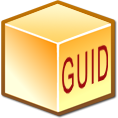 UUID_NAMEBASED_NS_OidPlusMisc
UUID_NAMEBASED_NS_OidPlusMisc
![]() Parent node: GUIDs for OIDplus (oidplus)
Parent node: GUIDs for OIDplus (oidplus)
Technical information
| UUID: | ad1654e6-7e15-11e4-9ef6-78e3b5fc7f22 |
| C++ notation: | { 0xad1654e6, 0x7e15, 0x11e4, { 0x9e, 0xf6, 0x78, 0xe3, 0xb5, 0xfc, 0x7f, 0x22 } } |
| Variant: | [0b10_] RFC 4122 (Leach-Mealling-Salz) / DCE 1.1 |
| Version: | [0x1] Time-based with unique host identifier |
| Timestamp: | [0x1e47e15ad1654e6] 2014-12-07 13:33:49'1292390 GMT |
| Clock ID: | [0x9ef6] 7926 |
| Node ID: | [0x78e3b5fc7f22] 78-E3-B5-FC-7F-22 |
| Input: | 78-E3-B5-FC-7F-22 |
| Type: | EUI-48 (Extended Unique Identifier) |
| EUI-48 or MAC-48: | 78-E3-B5-FC-7F-22 |
| EUI-64: | 78-E3-B5-FF-FF-FC-7F-22 (MAC-48 to EUI-64 Encapsulation) |
| IPv6-Link-Local address: | fe80::7ae3:b5ff:fefc:7f22 |
| Administration type (U/L flag): | [0] Universally Administered Address (UAA) |
| Transmission type (I/G flag): | [0] Unicast (Individual) |
Description
Namespace Universally Unique Identifier (UUID) for namebased UUIDs (as defined in IETF RFC 4122, clause 4.3).
The payload is a lower-case namespace, followed by a double colon, followed by the actual identifier, e.g. "isbn:978-3-16-148410-0". The value of the namespace of can be chosen by the user but a common Uniform Resource Name (URN) namespace is preferred.
Usage in OIDplus 1.0: Allows the mapping of Non-OID/DOI/UUID objects into the OID tree by creating OIDs inside a "auto generated arc". The "NS+ID" UUID is the second level in the auto generated arc.
Usage in OIDplus 2.0: Gives all objects (including OIDs) an alternative UUID-identifier (showed in the section "Alternative Identifiers"). Note: Auto-generated OIDs like in OIDplus 1.0 also exist in OIDplus 2.0, but they are constructed using a 31-bit-hash of the systems public key as the first level, and the 31-bit-hash of the NS+identifier in the second level. The 31-bit-hash allows to use the OID in software that is not compatible with 128-bit OIDs.
Alternative Identifiers
RDAP
REST API (Documentation)
guid:ad1654e6-7e15-11e4-9ef6-78e3b5fc7f22 | -- UUID_NAMEBASED_NS_OidPlusMisc
guid:oidplus | -- GUIDs for OIDplus
